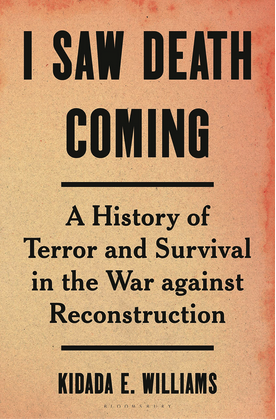
An associate professor of African American Studies at Wayne State University, historian Kidada E. Williams is one of the nation’s most knowledgeable and respected voices on the impact of racism and racial violence. In addition to writing for the likes of The New York Times and Slate, Williams also has been spotlighted in the award-winning PBS series Reconstruction: America After the Civil War. She currently appears in the Hulu documentary The 1619 Project, based on the groundbreaking New York Times series about slavery and racism in America.
Recently, Williams published her latest book, I Saw Death Coming: A History of Terror and Survival in the War Against Reconstruction, a searing examination into the often-perilous social circumstances that constantly menaced Black Americans’ lives during Reconstruction.
For Black History Month, EngageD sat down with Williams to discuss the research that drove her newest work and the current implications her findings hold for a nation that continues to grapple with racist attacks, social injustice and the ongoing trauma stemming from America’s “original sin.”
In your own words, what is I Saw Death Coming really about?
KIDADA WILLIAMS: Many of us who went to school in, I would say the past, maybe, 100 years — but certainly in the past 30 or 40 years — learned in K through 12 that Reconstruction failed. And what people aren't saying is who or what failed. But when they use that narrative, they're generally drawing on The Lost Cause narrative that's very much about The Civil War. ‘The Civil War wasn't over slavery; it was about state's rights.’ So, the Reconstruction component of that was Black people were freed. They had every chance in the world, and they failed to make the most of freedom. So that's what that failure narrative means, even if that's not what people say. 
So as a historian, I was looking at the records and looking at the later scholarship where, when you look at those records, it's very clear that Reconstruction didn't fail, that Black people absolutely made the most of freedom. But there has been this whole narrative about Black people failing during Reconstruction. What I wanted to do was write a new history of the Civil War that unpacked this story, that showed how African Americans picked themselves up from slavery, how they reunited their families, how they worked, how they voted. They were elected into office, they did all of these amazing things.
Because of their success, ex-Confederates targeted them with deadly violence. And they, in their efforts to resist that violence, risked their lives, and they stepped forward and they testified about it. They testified before Congress. They gave testimonies in other forums. I wanted to tell the story of Reconstruction from their perspective.
How did you conduct research for your book?
WILLIAMS: A lot of the records are available online. I had already looked at some of the records from The Freedmen's Bureau and at the National Archives when I was a graduate student. But a lot of the records are available online or they're in newspapers. They're in all of these other spaces. So, the research process really involved sitting down and, with each testimony, trying to understand what the survivors wanted, knowing about what happened to them. That matters because they're being interviewed by white men, members of Congress, many of whom support the Confederate cause whether they acknowledge it or not. And they're really hostile toward the Black survivors and their testimonies. There is a lot of doubt. ‘You’ve got to be making this up.’ They pull out a lot of racist tropes about Black people, (such as) ‘You can't believe Black people because Black people lie.’
But in reading their testimonies, what you see very clearly is how the Black survivors fight back against that. You know how they say no? They know white people, and they know white shenanigans, if you will, particularly the racist ones. They're very clear and steadfast in their insistence on not allowing the members of Congress to dismiss or denigrate them as they tell the stories of what happened to them. Because what they really want the nation to know is that there is no peace.
We've got this narrative that there is peace after the Civil War — but wars never end that neatly. Look at Afghanistan, look at Iraq. Wars don't end that neatly, and the Civil War certainly didn't. It was replaced by a new conflict, and that's the conflict of conservative white southerners doing what they can to roll back all the gains African Americans made — and doing it in very violent ways. And so African Americans come before Congress and say, ‘There is no peace. They are declaring war on us. And they're trying to overthrow Reconstruction and overthrow our freedom.’ That's the story.
Is there a particular exchange that stands out to you?
WILLIAMS: Yes! There is a black South Carolina man named Patrick Tanner, whose home had been raided by racists. He testifies before Congress, and there is a white lawmaker. I want to say he's from Ohio. His name is Philadelph Van Trump. I cannot make this up, right?
Essentially, he's saying, ‘They didn't hurt you when you came to your home,’ that they did not physically beat and kill Patrick Tanner. But what the lawmaker is really saying is, ‘They didn't hurt you and there's nothing for you to be afraid of.’ Patrick Tanner is saying — and it's very interesting — he's going back and forth with them and he's saying, ‘What they did is hurting me.’ For him, it's the active present tense. The violence and its aftermath are still ongoing for his family because his wife was injured in the raid. She wasn't physically injured, but she had been vulnerable going into the raid. Her pregnancy had recently come to term. He doesn't say what happened with the pregnancy, so we don't know.
We know she lived. We don't know if she had a live birth. But the raid following shortly after that left her devastated, and he was broken inside about how injured she was, by how traumatic the attack was for the family. That's why he's there saying, ‘No, what they did is hurting me. It's hurting my family. It's throwing us back in our business. I don't know if I'm going to be able to hold onto the land that I've acquired because they still won't leave us alone.’
That's part of that back and forth where a lawmaker is saying, ‘What they did isn't hurting you. You're exaggerating. There is nothing for you to be afraid about, unless you're irrationally afraid, Black people, because that's what we think of you.’ Those are the racist tropes that are playing there. And Patrick Tanner is saying, ‘No, that's not what's going on here. They did hurt me, and they are still hurting me. This violence is hurting me, and that's why we want you to do something about it.’
The book focuses on Reconstruction, which extended from 1863 to 1877, but has resonance today. Tell us why the book, these stories and this research remain pertinent in 2023.

WILLIAMS: I think it's pertinent for a number of reasons. The failure to listen to Black people and to meaningfully deal with the white people who deliberately target them is why we're still dealing with the violence that we're seeing today, against unarmed Black people, by police, by vigilantes. This anti-black violence has a long history that dates back, particularly to this period of Reconstruction. Enslavers weren't killing the people they held in bondage all willy-nilly. That doesn't make financial sense. As I tell my students, that math don't math.
But it is free Black people who are invested in self-determination, who are invested in liberation, now them, they will target with deadly violence. That is a moment where Black people's lives don't matter in the minds of the enslaving class and the rest of the nation that's willing to let them go on with this violence.
The other reason why I think this story is important for today is, I think it could help us get clarity on the real threat of white supremacy today. I think part of what happens — and I see this with my students a lot — is we have allowed this narrative of white supremacy and racism to be constructed or understood as a matter of preference, as if white supremacists just “don't prefer” Black people — as opposed to the reality, which is that white supremacists believe that Black people are meant to be exploited, used and abused by white people and they're supposed to like it and go along with it.
Why that matters in this moment is because we do have people, we have forces, that are working very hard to get back a system that's very much like Jim Crow. For some people, if they could get us back in slavery, they would. But for others, I feel like they will settle for Jim Crow. And we need to know that that's what they want so that we can organize to defend ourselves. There are some historians, Black historians even, who are saying, ‘Well, we need a third Reconstruction.’
And my question to them is, which part? The revolutionary reform, which we got during Reconstruction, the vote, black land ownership, black office holding, schools, churches, families reunited, weddings, businesses, all of the rest of the stuff, is that the part of the Reconstruction you're saying we need another one of? Or the reactionary violence to tear all of that down? Because that happened with the first Reconstruction, that happened with the second Reconstruction of the civil rights movement. And even if we somehow magically get a new state of revolutionary reforms, we have to be prepared for and ready to address the realities of the white backlash. We're seeing the white backlash right now.
And I think the last reason this history matters today is because the governor of Florida is going out of his way to make sure that no one learns about it. And what he doesn't want people to learn about is this revolutionary moment where Black people play a significant role in extending and helping the nation build upon and extend freedom to more people than had ever happened up until that point — and that white supremacists tore it all down.
It reveals how fragile our democracy is. And I think about people who support these ‘bans on Critical Race Theory,’ which, trust me, none of our students are learning in school. They are not learning Critical Race Theory in school; they are barely learning the basics. In fact, many of my students are still getting the same kind of history that I got growing up in Muskegon in the 1970s and '80s. They're getting the exact same history, Harriet Tubman, Frederick Douglass, see the next chapter for Martin Luther King, Jr., right?
I remember what my textbooks looked like, and to talk to students, they're not getting much better than that in many of the schools. And I think that forces like Gov. DeSantis down in Florida and those who are trying to ban the teaching of Black history, what they want is for us to not know about those revolutionary moments. I call these white comfort bills. These are bills to make sure that white children are always comfortable in a classroom. They really don't care about what happens to Black and brown students in those classrooms. But what they're more concerned about is that the white students might actually believe in justice. They might actually fight for a better world. And they want to make sure that they don't do that, and they can do that by keeping them ignorant.
Someone recently pointed out that the majority of the people we saw during the George Floyd protests, these were not Black kids, Black adults. These were white folks who were out in places like Minnesota and Portland. Would this be an example?
WILLIAMS: Exactly. That got them shook. They are shook because they were like, ‘There are white people out here protesting this? There are white people doing all of this? Oh, no, we got to stop it. And we got to stop it in K through 12.’ That's what they did getting the Lost Cause narrative into the K through 12 schools in the South. They understood the power of education. The Daughters of the Confederacy, they understood the power of education and if you could keep the children ignorant, if you could spin a distorted version of this history, then they will retain the status quo, the racist status quo and the system of Jim Crow apartheid that we had.
Naturally, your research for I Saw Death Coming looks back on history. But are there any prescriptive elements in the book for readers moving forward?
WILLIAMS: I'm a historian. Political scientists and sociologists, they deal with the present day. I help us understand what happened in the past. But I think there are lessons, right? There are lessons that we can learn from the past to deal with the world that we live in today, understand the devastating effects of violence and play a very active role in building a more just world to eliminate it.
A lot of what that requires is understanding. During Reconstruction and during the civil rights movement, you have these interracial coalitions of progressive whites and progressive Black folks who come together, who unite to fight the oppressive forces in the society. And so that's a lesson. I tell my students this: ‘We didn't start the fire. As Black people, we didn't start this fire. We have had to live in the reality of it.’
And us wanting racism and racism-based violence to disappear isn't enough. We need the white people who see themselves as good to work with us in order to end this violence. That’s what happened in the past, that's what we need to happen today. And we need to pay attention because there are all of these great models, there are all of these great organizing campaigns where people are doing this very work. None of us has to do it alone. We just have to tap into the work that's already being done, even in places here in Detroit.
